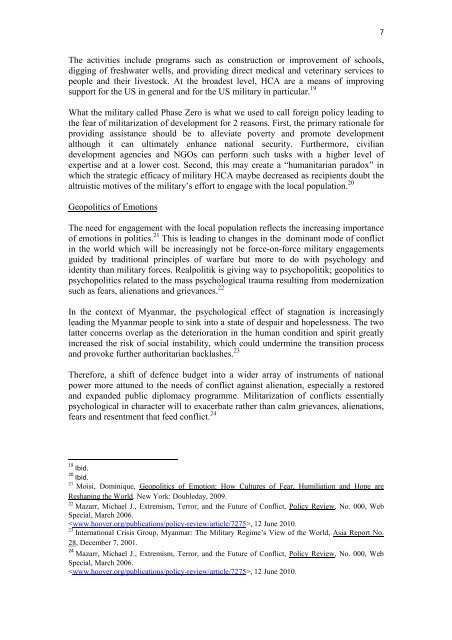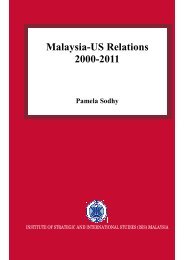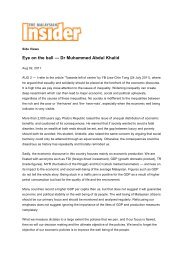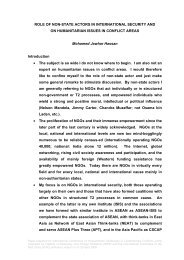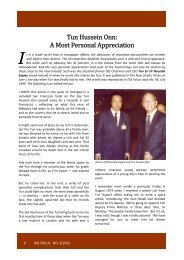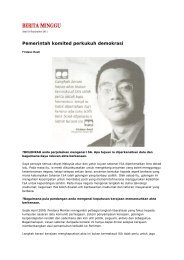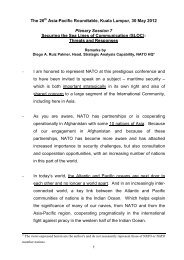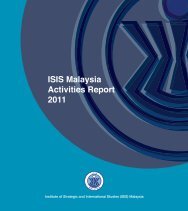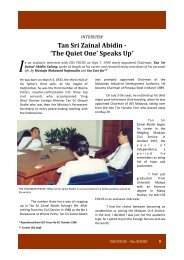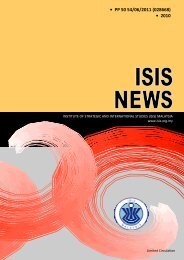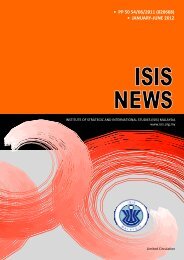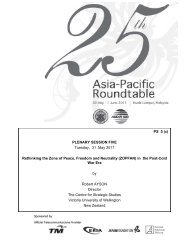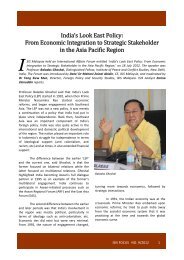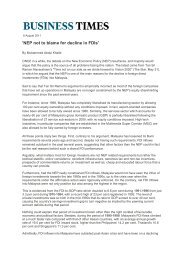Soft Power of Defence Diplomacy: A New Approach ... - ISIS Malaysia
Soft Power of Defence Diplomacy: A New Approach ... - ISIS Malaysia
Soft Power of Defence Diplomacy: A New Approach ... - ISIS Malaysia
Create successful ePaper yourself
Turn your PDF publications into a flip-book with our unique Google optimized e-Paper software.
7The activities include programs such as construction or improvement <strong>of</strong> schools,digging <strong>of</strong> freshwater wells, and providing direct medical and veterinary services topeople and their livestock. At the broadest level, HCA are a means <strong>of</strong> improvingsupport for the US in general and for the US military in particular. 19What the military called Phase Zero is what we used to call foreign policy leading tothe fear <strong>of</strong> militarization <strong>of</strong> development for 2 reasons. First, the primary rationale forproviding assistance should be to alleviate poverty and promote developmentalthough it can ultimately enhance national security. Furthermore, civiliandevelopment agencies and NGOs can perform such tasks with a higher level <strong>of</strong>expertise and at a lower cost. Second, this may create a “humanitarian paradox” inwhich the strategic efficacy <strong>of</strong> military HCA maybe decreased as recipients doubt thealtruistic motives <strong>of</strong> the military’s effort to engage with the local population. 20Geopolitics <strong>of</strong> EmotionsThe need for engagement with the local population reflects the increasing importance<strong>of</strong> emotions in politics. 21 This is leading to changes in the dominant mode <strong>of</strong> conflictin the world which will be increasingly not be force-on-force military engagementsguided by traditional principles <strong>of</strong> warfare but more to do with psychology andidentity than military forces. Realpolitik is giving way to psychopolitik; geopolitics topsychopolitics related to the mass psychological trauma resulting from modernizationsuch as fears, alienations and grievances. 22In the context <strong>of</strong> Myanmar, the psychological effect <strong>of</strong> stagnation is increasinglyleading the Myanmar people to sink into a state <strong>of</strong> despair and hopelessness. The twolatter concerns overlap as the deterioration in the human condition and spirit greatlyincreased the risk <strong>of</strong> social instability, which could undermine the transition processand provoke further authoritarian backlashes. 23Therefore, a shift <strong>of</strong> defence budget into a wider array <strong>of</strong> instruments <strong>of</strong> nationalpower more attuned to the needs <strong>of</strong> conflict against alienation, especially a restoredand expanded public diplomacy programme. Militarization <strong>of</strong> conflicts essentiallypsychological in character will to exacerbate rather than calm grievances, alienations,fears and resentment that feed conflict. 2419 Ibid.20 Ibid.21 Moisi, Dominique, Geopolitics <strong>of</strong> Emotion: How Cultures <strong>of</strong> Fear, Humiliation and Hope areReshaping the World. <strong>New</strong> York: Doubleday, 2009.22 Mazarr, Michael J., Extremism, Terror, and the Future <strong>of</strong> Conflict, Policy Review, No. 000, WebSpecial, March 2006., 12 June 2010.23 International Crisis Group, Myanmar: The Military Regime’s View <strong>of</strong> the World, Asia Report No.28, December 7, 2001.24 Mazarr, Michael J., Extremism, Terror, and the Future <strong>of</strong> Conflict, Policy Review, No. 000, WebSpecial, March 2006., 12 June 2010.


